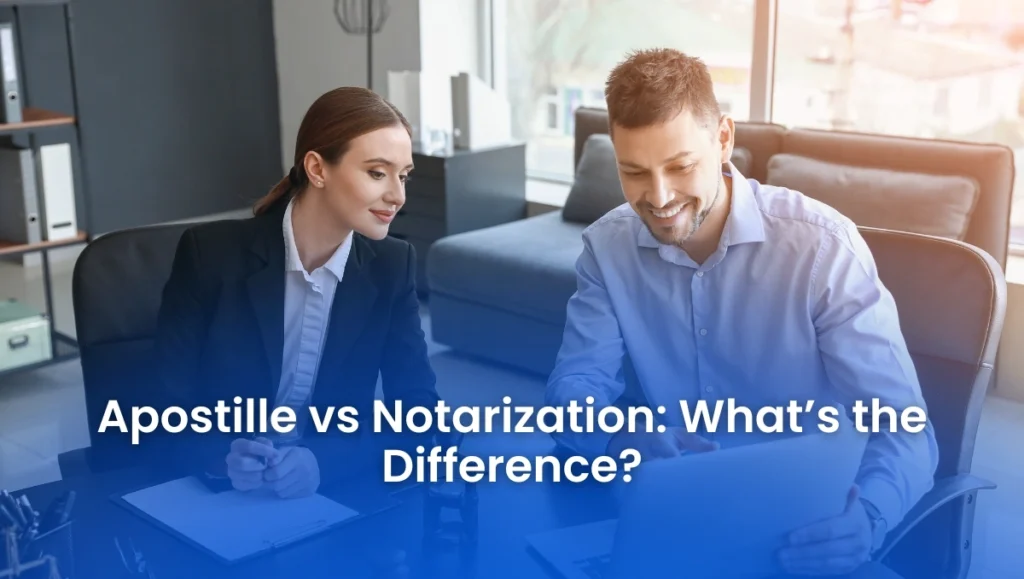Did you know that notary public fees usually start at $10 per signature, while an apostille can cost anywhere from $10 to $200 per document? The stark price gap between apostille and notarization shows their different purposes and legal authority.
An apostille serves as a specialized certificate that proves public documents’ authenticity in Hague Convention countries. Notarization will give a document legal validity inside the United States, but an apostille provides legal recognition beyond international borders. Companies need apostilles to prove their documents right when they establish new entities in foreign countries.
The differences between these two authentication methods deserve a closer look – from their processes to specific requirements and use cases. You’ll discover the right time to use each certification type and learn to sidestep common mistakes that could get your documents rejected during international transactions.
Common situations that require notarization or apostille

Document authentication can be confusing, especially when deciding between notarization, an apostille, or both. Let’s get into the most common situations that require each type.
Notarization serves as a verification of identity and willing participation in signing documents. Notarized documents are typically used within the United States.
Domestic documents commonly requiring notarization:
| Document Type | Purpose |
| Real estate contracts & deeds | Property transactions |
| Powers of attorney | Legal representation |
| Affidavits | Sworn statements |
| Loan documents | Financial agreements |
| Wills & trusts | Estate planning |
Apostilles authenticated documents that will be used in foreign countries participating in the 1961 Hague Convention.
International documents commonly requiring apostille:
| Document Type | Common Situations |
| Birth certificates | Working abroad, foreign marriage, or adoption |
| Death certificates | Burying deceased family members abroad or settling estates in foreign countries |
| Academic credentials | Studying or working abroad |
| Corporate documents | Setting up businesses internationally |
| Marriage certificates | Marrying in a foreign country |
Some situations need both notarization and apostille. To cite an instance, see academic credentials that need authentication abroad – you must get an official copy from the registrar with a notarial certificate before getting an apostille.
The authentication process is different based on the destination country. Countries that are part of the Hague Convention need an apostille, while others require an authentication certificate.
The U.S. Department of State issues apostilles for federal documents, including those signed by U.S. federal officials or consular officers. State-issued documents like birth certificates or state-notarized documents get their apostilles from that state’s secretary of state.
Understanding these differences between apostille and notarization helps ensure your documents receive legal recognition wherever needed.
How notarization works: Step-by-step
The notarization process uses specific protocols to verify identity and ensure document authenticity. Notarization serves domestic purposes, unlike apostilles which authenticate documents for international use. Let me break down the notarization process step by step:
| Step | Description |
| 1. Personal Appearance | Signer must appear before the notary (in-person or via approved online platforms) |
| 2. Identity Verification | Notary verifies the signer’s identity through acceptable methods |
| 3. Document Review | Notary confirms document is complete with no blank sections |
| 4. Assessment of Awareness | Notary determines signer’s awareness and willingness |
| 5. Performance of Notarial Act | Notary performs requested act (acknowledgment, jurat, etc.) |
| 6. Completion of Certificate | Notary completes notarial certificate with signature and seal |
Notaries can use three main methods to verify identity:
| Verification Method | Description |
| ID Documents | Government-issued photo ID with signature (driver’s license, passport) |
| Personal Knowledge | Notary personally knows the signer through sufficient prior dealings |
| Credible Witnesses | One or two witnesses who know the signer and can verify identity |
Notaries must make sure signers understand their documents and sign them without any pressure. They need to make a simple judgment about the signer’s ability to understand the document.
The notary carries out specific acts after verifying identity:
- An acknowledgment verifies the signer acknowledges their signature
- A jurat requires the signer to swear/affirm the document’s contents are true
- A signature witnessing confirms the signature belongs to the identified individual
State-of-the-art technology has created new options for notarization. Remote Online Notarization (RON) lets notaries work through audio-visual technology instead of meeting in person. The notary still needs to verify identity, watch signatures, and complete digital certificates.
Traditional notarization costs around $10 per notarial act, while online notarization can cost up to $25.
How apostille works: Step-by-step
An apostille authenticates documents for international use through a specific government-issued certificate, which differs from notarization that confirms signatures domestically. The authority that issues your apostille depends on your document type – state or federal.
Determining Document Type
You need to identify your document type before starting the apostille process. This will determine the issuing authority:
| Document Type | Issuing Authority | Examples |
| State Documents | Secretary of State in document’s originating state | Birth certificates, marriage licenses, notarized documents |
| Federal Documents | U.S. Department of State in Washington D.C. | FBI background checks, federal court documents, naturalization certificates |
Apostille Process Steps
| Step | Description | Notes |
| 1. Document Preparation | Ensure document is original or properly certified copy | Photocopies are typically not acceptable |
| 2. Pre-Authentication | Some documents require certification or notarization first | Educational diplomas often need this |
| 3. Submission | Send to appropriate authority with required materials | Can be done by mail or in person |
| 4. Payment | Pay the required fee | Typically $10 per apostille, plus potential handling fees |
| 5. Processing | Wait for authority to verify and issue apostille | Processing times vary by agency |
| 6. Receipt | Receive document with apostille certificate attached |
Required Materials
A complete apostille request has these items:
- Original document or certified copy
- Cover sheet stating the destination country
- Payment (approximately $10 per apostille)
- Self-addressed return envelope
- Special handling fee ($6.00 in some states for in-person requests)
Processing times can vary substantially. State apostilles take 1-3 business days, while federal apostilles need 2-3 weeks.
The apostille certificate confirms the signature of the public official who signed your document and their capacity to act. It also verifies the seal or stamp’s identity when needed. Keep in mind that an apostille doesn’t confirm your document’s contents—just its authenticity.
Apostille vs Notary: Key differences and future trends

Apostille and notarization differ in their scope and authority. These two authentication methods serve different purposes in the legal document world.
| Feature | Apostille | Notarization |
| Primary Purpose | Authenticates document origin for international use | Verifies signer’s identity and willingness |
| Legal Authority | Verifies document authenticity | Verifies signatures only |
| Issuing Entity | Government agencies (Secretary of State) | Commissioned notary publics |
| Geographic Validity | International (Hague Convention countries) | Primarily domestic (within state of commission) |
| Cost Range | $10-$200 per document (Depending upon DIY vs Agencies used and also the timelines) | Starting at $10 per signature (while mobile notaries come with a travel fee) |
| Legal Weight | Higher international legal authority | Limited to state of commission |
A notarized document meets local legal standards, but an apostille carries more legal power across borders. Notary publics can only work within their commissioned state to authenticate signatures. An apostille, however, proves the document’s origin and authenticity when used internationally.
The authentication world is changing with these new trends:
| Future Trend | Impact on Document Authentication |
| E-Apostilles | Digital apostille certificates for electronic documents |
| Blockchain Integration | Immutable ledger for notarized documents preventing tampering |
| Remote Online Notarization | Video-based notarization eliminating geographical barriers |
| Artificial Intelligence | Automating routine notarial tasks like document review |
| International Standardization | More countries adopting Hague Convention requirements |
The United States does support e-Apostilles in theory, as part of its participation in the Hague Apostille Convention, but their use is currently limited. Most U.S. states, including Oregon, still require traditional paper-based apostilles, meaning documents must be physically mailed for authentication. While some pilot programs and jurisdictions are experimenting with issuing electronic apostilles for digitally signed documents, a nationwide system has not yet been fully implemented. Efforts are underway, led by organizations like the Hague Conference and the National Notary Association, to expand the use of e-Apostilles in the U.S., but as of now, paper apostilles remain the standard in most states.
Conclusion
The difference between apostilles and notarizations plays a vital role in document authentication. Here’s a simple breakdown of the main differences:
| Authentication Type | Best Used For | Key Benefit |
| Notarization | Domestic documents | Quick, local verification |
| Apostille | International documents | Cross-border recognition |
Your document’s intended use determines whether you need an apostille or notarization. Notarization works well for domestic needs and costs $10 per signature. But international documents, especially in Hague Convention countries, need an apostille. The costs range from $10 to $200 per document. This again depends upon whether you have the time and are doing it yourself or using a service and how soon you need the apostille done.
Note that some documents need both services – notarization first, followed by an apostille. This two-step authentication will give a proper recognition both domestically and internationally. It helps avoid legal issues and processing delays.
Not Sure if You Need a Notarization or an Apostille? We Can Help.
Understanding the right authentication for your document is crucial. At Oregon Apostille Hub, we guide you through every step—whether you need a local notarization, an apostille for international use, or both.
Avoid delays and confusion—contact us today for expert advice and fast, reliable service tailored to your needs.

